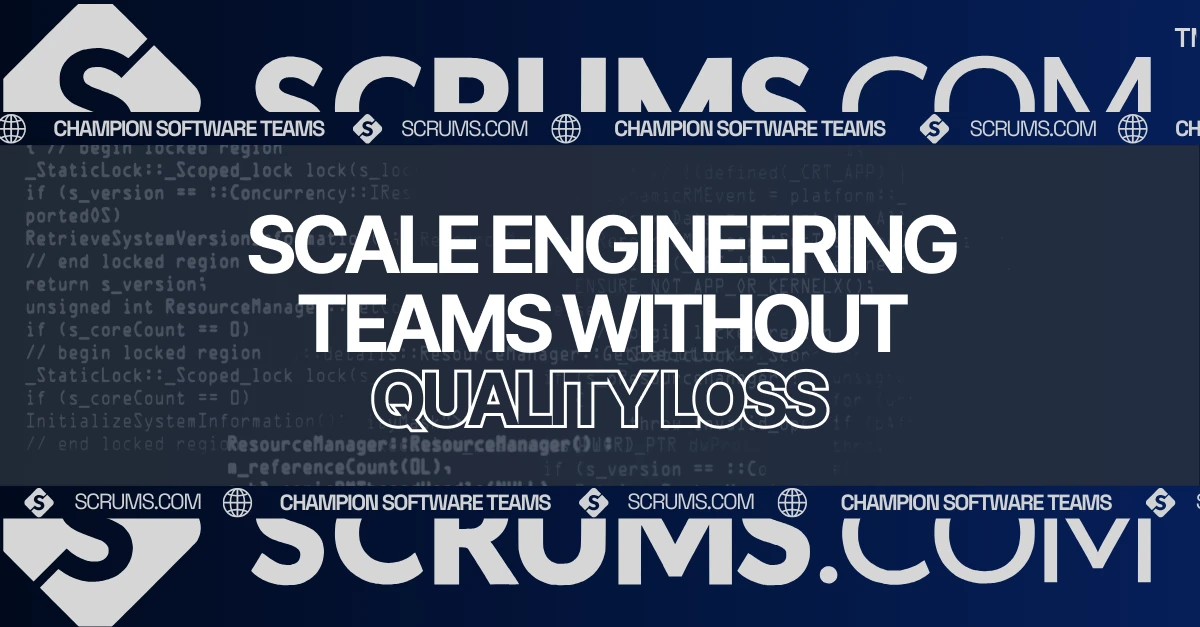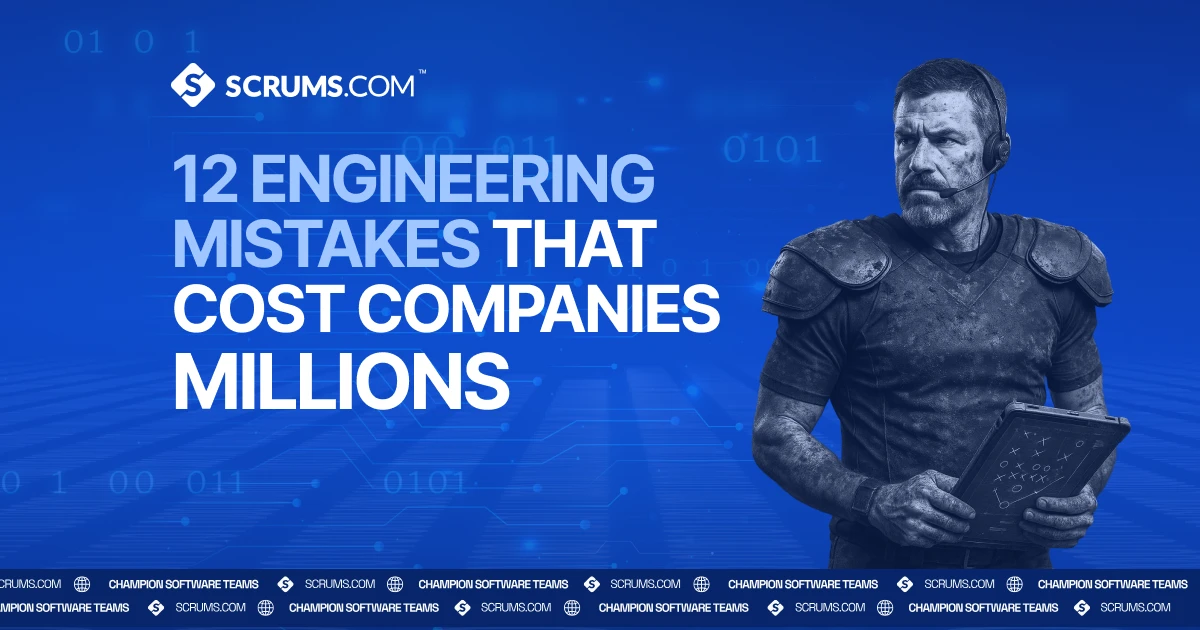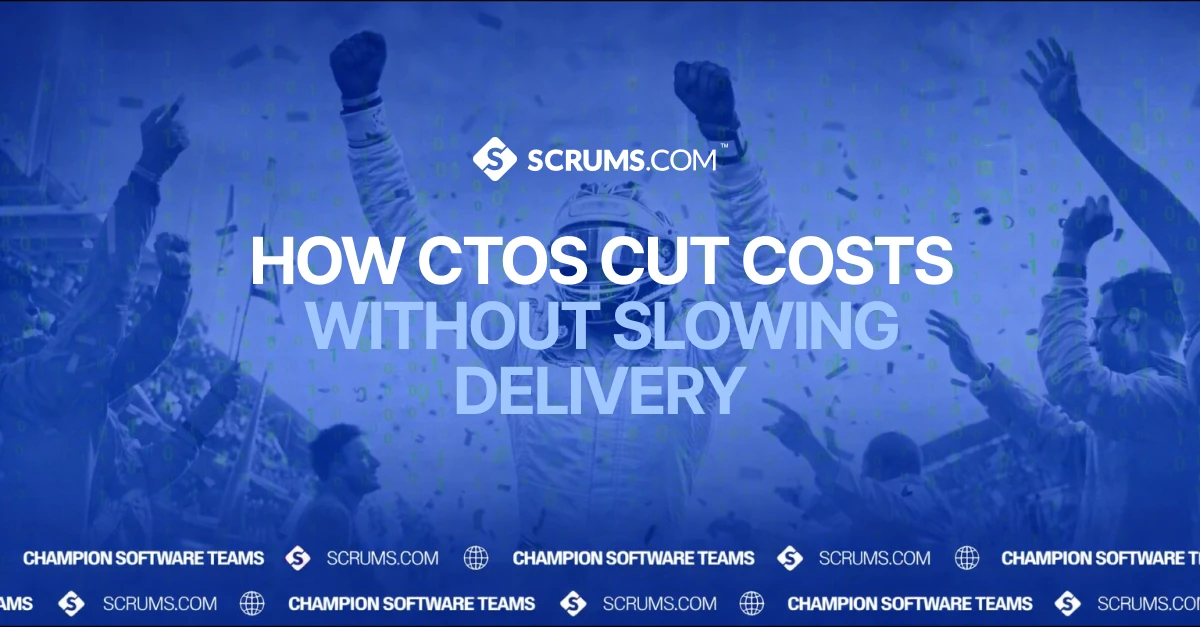Logistics & Supply Chain Software Development
In logistics and supply chain, margins are thin and stakes are high. From real-time tracking to predictive analytics, Scrums.com enables companies to digitize operations, build resilient platforms, and deploy AI agents that optimize every link of the chain.







































Years of Service
Client Renewal Rate
Vetted Developers
Ave. Onboarding
Logistics Software That Optimizes Every Mile and Dollar
Build logistics and supply chain platforms that provide end-to-end visibility and operational efficiency. Our platform-first approach combines logistics domain expertise, AI-powered optimization, and IoT integration, delivering modern supply chain software at 40-60% lower cost than traditional consultancies.
- Real-time shipment tracking across all transportation modes
- Route optimization reducing fuel costs by 25%
- Warehouse automation improving pick/pack efficiency 40%
- Predictive analytics for demand forecasting and inventory planning
- IoT sensor integration for condition monitoring and asset tracking
- Access 8,500+ specialists in logistics technology, supply chain systems, and transportation management
Transform supply chain operations with SEOP's logistics-ready delivery framework.

Top Challenges Logistics Companies Face
Logistics and supply chain companies struggle with legacy systems, manual processes, and lack of real-time visibility. Without modern technology, operational costs spiral, customer satisfaction suffers, and competitive advantage erodes. Digital transformation is no longer optional, it's survival.
Legacy systems and manual processes everywhere
Core logistics operations run on spreadsheets, phone calls, and paper documentation. Tracking shipments requires calling drivers. Warehouse operations are manually coordinated. Route planning is done by experienced dispatchers, not algorithms. Every manual process introduces delays, errors, and unnecessary costs.
Zero real-time visibility across the supply chain
You can't answer "where's my shipment?" without making phone calls. Customers lack self-service tracking. Data silos prevent holistic supply chain visibility. Inventory locations are uncertain. Warehouse capacity is opaque. Decisions are made with outdated information, missing optimization opportunities worth millions.
Scaling operations globally is impossibly complex
Expanding to new regions requires integrating carriers, customs systems, and compliance requirements. Multi-modal transportation (truck, rail, air, ocean) creates coordination nightmares. Each region has different regulations. Your systems can't handle the complexity. Global growth is manually intensive and error-prone.
Fluctuating demand and seasonality pressure
E-commerce peak seasons (Black Friday, holidays) create massive volume spikes. Agricultural shipments are highly seasonal. Your capacity planning is reactive, not predictive. You either miss revenue opportunities (insufficient capacity) or waste money (excess capacity). Accurate demand forecasting seems impossible.
Cannot deliver predictive analytics and optimization
Customers demand route optimization, accurate ETAs, and proactive exception management. Your competitors use AI for dynamic routing, predictive maintenance, and demand forecasting. You lack the data infrastructure and ML expertise to compete. Manual operations can't match algorithmic optimization, costs stay high while service quality lags.
Talent shortage in logistics technology and IoT
Finding developers who understand logistics operations AND modern technology (cloud, IoT, machine learning) is nearly impossible. Supply chain domain knowledge takes years to develop. Your IT team maintains legacy systems but can't build modern platforms. Innovation stalls due to skills gap.
Key Outcomes Scrums.com Delivers
Real-Time End-to-End Supply Chain Visibility
Build unified visibility platforms that track shipments from origin to destination across all transportation modes. Real-time location data from GPS/IoT sensors, automated status updates, exception alerts, and accurate ETAs. Customers get self-service tracking portals. Operations teams gain actionable insights. Supply chain visibility reduces customer inquiries by 60% while improving on-time delivery performance.
Predictive Analytics Cut Costs and Improve Delivery Times
Deploy machine learning models for route optimization (reduce fuel costs 20-30%), demand forecasting (optimize inventory levels), predictive maintenance (prevent vehicle breakdowns), and dynamic pricing. AI-powered systems consider traffic, weather, vehicle capacity, delivery windows, and cost constraints—finding optimal solutions humans can't match manually.
Scalable Platform Supports Global Logistics Operations
Build cloud-native logistics platforms that handle multi-region operations, multi-modal transportation, and complex compliance requirements. Support millions of shipments annually with elastic infrastructure that scales automatically. Integrate customs clearance, trade compliance, and regional carriers without custom development for each market.
Reduced Manual Operations Improve Efficiency 40%
Automate warehouse operations (pick/pack/ship), transportation coordination, invoicing, and customer service. IoT sensors automatically capture temperature, humidity, and shock data for cold chain and fragile goods. Automated alerts for exceptions (delays, damage, route deviations) enable proactive problem-solving before customers complain.
Better Customer Experience Through Transparency and Communication
Provide customers with accurate ETAs, proactive delay notifications, self-service tracking, and proof-of-delivery automation. Modern customer portals reduce phone calls to dispatch by 70%. Real-time visibility builds trust. Automated communication (SMS, email, API webhooks) keeps customers informed without manual intervention.
How Scrums.com Solves Logistics Development Challenges
We provide logistics domain expertise, supply chain architecture specialists, and transportation technology designed for 3PLs, freight forwarders, and logistics operators. Our model delivers transformation with operational continuity.
Software Engineering Orchestration Platform (SEOP)
Centralize logistics software delivery with unified visibility across TMS, WMS, real-time tracking, and customer platforms. SEOP provides operational metrics, delivery performance tracking, and deployment monitoring, ensuring every release improves efficiency without disrupting daily operations.
AI Agent Gateway
Deploy AI agents for route optimization, demand forecasting, predictive maintenance, and automated customer service. Our gateway integrates with existing logistics systems while maintaining data security, accelerating intelligence and automation without platform replacement.
Dedicated Development Teams
Access logistics technology specialists (TMS, WMS, IoT integration, route optimization, supply chain visibility) organized into high-performing squads. Pre-vetted for logistics domain knowledge and transportation technology expertise. Deploy in 21 days with full integration into your operations.
Product Development as a Service (PDaaS)
Launch new logistics products (real-time tracking platforms, customer portals, warehouse management systems, route optimization tools) with end-to-end managed delivery. We handle discovery, design, development, integration, and deployment, while you maintain strategic control. Fixed timelines, logistics-grade quality.
Staff Augmentation
Fill critical skill gaps with specialized logistics engineers (IoT integration, route optimization algorithms, cloud infrastructure, mobile development). Vetted for supply chain domain knowledge and logistics technology standards. Scale resources monthly as digital transformation initiatives evolve.
Developer Analytics & Delivery Insights
Prove technology ROI with real-time velocity tracking, operational metrics monitoring, and cost analysis. Monitor deployment frequency, system uptime, on-time delivery rates, and customer satisfaction scores. Make data-driven decisions about platform investments and optimization priorities.
Our Logistics Software Development Approach
Our logistics software methodology combines operational efficiency with the visibility modern supply chains demand:
1. Operations & Systems Assessment
We start by mapping your current logistics workflows, technology landscape, and pain points across transportation, warehousing, and customer service. Our team assesses TMS/WMS capabilities, integration architecture, and data availability. We prioritize initiatives that reduce costs, improve service quality, and enable real-time visibility.
2. Logistics-First Architecture Design
Cloud-native platforms designed specifically for logistics scale, real-time performance, and IoT integration requirements. We architect for multi-tenant SaaS, microservices, event-driven systems, and mobile-first experiences. Built to handle millions of shipments, real-time sensor data, and global operations.
3. Agile Development with Logistics Expertise
Two-week sprints with automated testing, performance validation, and operational metrics tracking. Our developers understand logistics domain requirements (EDI, carrier APIs, customs documentation, hazmat regulations). Every sprint delivers working features validated with real operational scenarios and load testing.
4. AI-Powered Optimization & Intelligence
Implement route optimization, demand forecasting, predictive maintenance, and automated decision-making using machine learning. Our AI specialists build models trained on historical logistics data, continuously improving as more operational data accumulates. Focus on measurable ROI (cost reduction, service improvement).
5. IoT Sensor Integration & Real-Time Data
Connect GPS trackers, temperature sensors, shock detectors, and telematics devices to create real-time supply chain visibility. We integrate with IoT platforms, handle high-volume sensor data streams, and build alerting systems for exception management. Real-time data enables proactive operations instead of reactive firefighting.
6. Continuous Optimization & Scaling
Post-launch monitoring, performance tuning, and capability enhancements. We track operational KPIs (on-time delivery, cost per mile, warehouse throughput, customer satisfaction). Continuous optimization using operational data and machine learning improves efficiency over time, logistics platforms that get smarter with usage.
Why Leading Logistics Companies Choose Scrums.com
Platform-First Software Delivery
Our Software Engineering Orchestration Platform (SEOP) unifies tools, talent, and delivery into one intelligent layer—giving you real-time visibility and control.
AI-Enabled Talent
Every team operates within our AI-powered ecosystem via the Agent Gateway, increasing efficiency, reducing risk, and ensuring delivery quality.
Compliance & Governance
We understand industry regulations. Our delivery model includes compliance-first architecture, audit trails, and controlled AI deployment that adapts to your sector's requirements.
Transparent, Real-Time Analytics
No black boxes. Access live dashboards showing velocity, blockers, DORA metrics, and team performance across every sprint.
Logistics & Supply Chain Success Stories
Common Logistics Software Development Questions
Do you have experience with transportation management systems (TMS)?
Yes. We've built TMS platforms from scratch and integrated with existing systems (Oracle TMS, SAP TM, MercuryGate). Our developers understand freight management, carrier integration, load optimization, and multi-modal transportation. We've implemented EDI connections, API integrations with major carriers, and custom routing algorithms.
Can you help with warehouse management system (WMS) development?
Absolutely. We've developed WMS solutions for pick/pack/ship optimization, inventory management, barcode/RFID tracking, and warehouse automation integration. Our teams understand slotting optimization, wave picking, cross-docking, and real-time inventory synchronization with e-commerce and ERP systems.
How quickly can we launch real-time tracking capabilities?
With Product Development as a Service (PDaaS), we can deliver MVP real-time tracking platforms (GPS integration, customer portals, automated notifications) in 12-16 weeks. For dedicated teams augmenting existing development, you'll have vetted logistics specialists integrated within 21 days.
Can you integrate IoT sensors and telematics devices?
Yes. We've integrated GPS trackers, temperature/humidity sensors, shock detectors, and vehicle telematics systems. Our teams build high-volume data pipelines that ingest sensor data, trigger alerts based on business rules, and provide real-time dashboards. Experience with IoT platforms (AWS IoT, Azure IoT, custom MQTT brokers).
What about route optimization and demand forecasting AI?
We've implemented route optimization algorithms (vehicle routing problems, traveling salesman optimization) and demand forecasting models using machine learning. Our AI specialists build models that consider constraints (delivery windows, vehicle capacity, driver hours, traffic patterns) to find optimal solutions that reduce costs while meeting service commitments.
How do you handle customs clearance and trade compliance?
We've built customs documentation systems, trade compliance platforms, and integrated with customs broker APIs. Our teams understand HS codes, tariffs, country-of-origin documentation, and regulatory requirements. We automate customs paperwork generation, track compliance, and integrate with government systems (ACE, CHIEF).
Can you help modernize legacy logistics systems?
Yes. Many logistics companies run on decades-old systems. We use API-first architecture, event-driven integration, and phased migration strategies to modernize logistics technology without disrupting daily operations. Proven experience integrating modern platforms with legacy TMS, WMS, and ERP systems.
What's the cost compared to hiring in-house logistics developers?
You'll save 40-60% compared to US/UK hiring costs while accessing specialized logistics technology expertise. No recruitment fees, benefits overhead, or long ramp-up time. Transparent monthly subscriptions with flexibility to scale as supply chain transformation initiatives evolve.

































.png)

